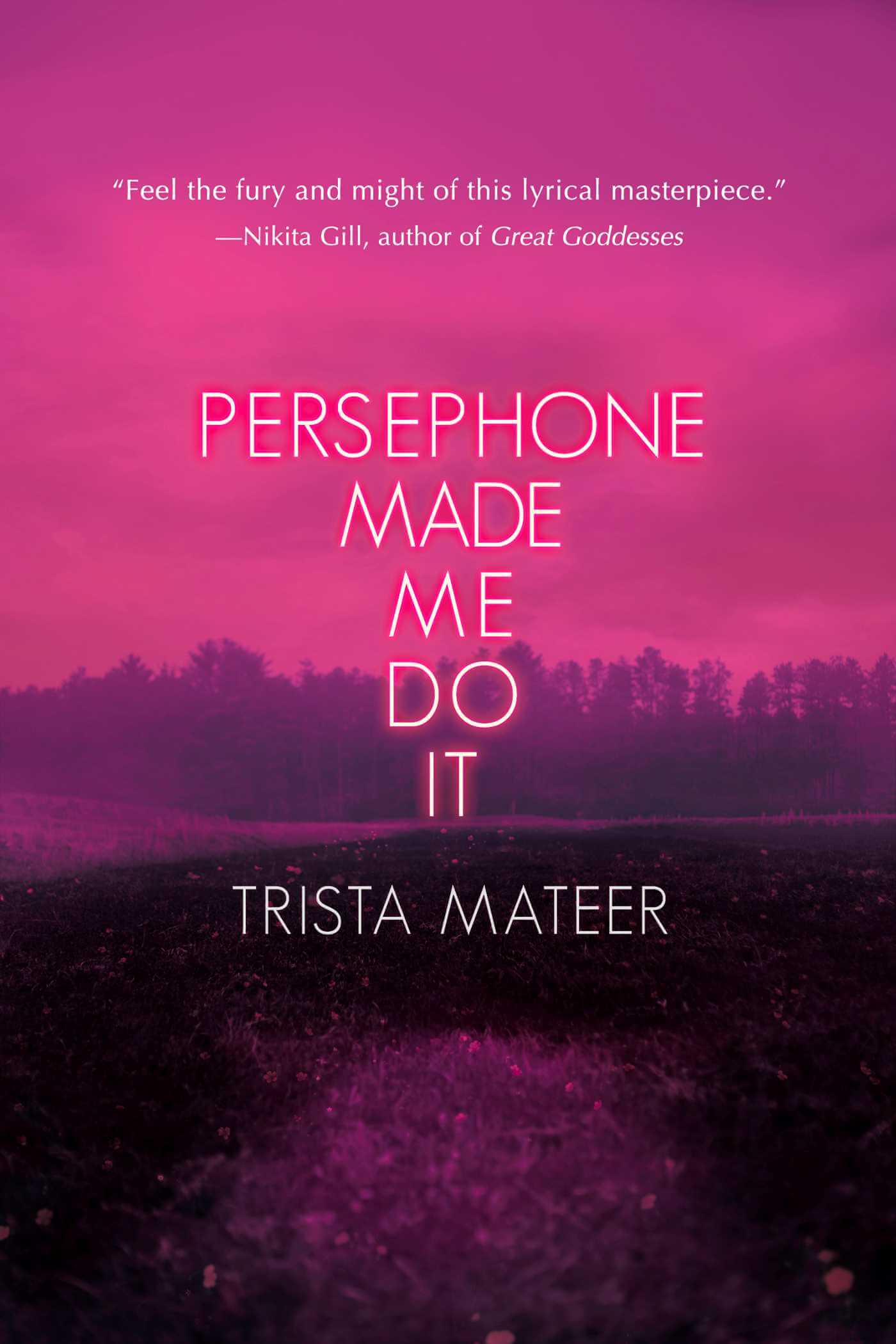
Review
Persephone Made Me Do It
By Trista Mateer
Central Avenue Poetry
ISBN: 978-1771682916
Review by Laurie Nguyen
Persephone Made Me Do It by Trista Mateer is a powerful collection of poetry that delves into the psyche of a woman who has to live with past regrets and trauma, pushing to reclaim what’s left of herself and rebuild from it. The collection is separated into seven parts, detailing Mateer’s conversation with Persephone, the Goddess of Spring and Death. Mateer tears herself apart in Persephone’s company, desperately trying and failing to push back the darkness in her mind. As the conversation continues, the two weep for their lost innocence as they persevere through the destruction the men in their lives have forced upon them.
Tarot cards are a great way to help people find themselves in times of strife.
However, doing a reading for yourself can be intense, so for Trista to reveal this reading throughout the collection illustrates how much she values authenticity. This, combined with her dialogue with Persephone, shows how crucial it is for Trista to support the women reading this book, regardless of age, ethnicity, race, or any other label America likes to implement. Moreover, portraying the cards as photographs helps the book be more accessible to women who might feel her presentation is too witchy or spiritual for them.
Which is why I love the way Mateer treats Persephone’s narrative. Despite her being a goddess, people who acknowledge her suffering are rare. So many retellings, especially those in the romance genre, want to paint Persephone as a willing participant in Hade’s machinations. Although it’s supposed to be “dark and sexy,” there’s a reason why Greek Legends call it the “Rape of Persephone.” Even Persephone said to herself, “I thought I would be safe, being God’s daughter. I thought I would be the exception instead of the rule.” In alternative spiritualities like witchcraft, the journey to the Underworld is heralded as a practitioner’s awakening; they come back stronger and wiser than they have before. But every neophyte treats it as some whimsical adventure with a happy end. They’re blinded by the allure of their journeys, not realizing that change may turn them into something they regret.
Furthermore, Mateer masterfully uses Persephone and Demeter to mirror her relationship with her mother. She uses repetitive phrases that demonstrate how she and her mother’s dreams were mutilated. They “want their daughters to save them,” not understanding that “all daughters know they cannot save their mothers.” Mateer doesn’t mince words when she recounts how addictive it can be to fight with her maker since daughters need “a mortal enemy and a god that looks like her.” It also reminds me of something I heard from an old horror movie called Silent Hill, that a mother “is god in the eyes of a child.” Reading this now, Mateer definitely has an antagonistic view of her mother. But then again, who wouldn’t? Mateer wanted her mother to protect and cherish her even after what she had gone through. But she didn’t, and Mateer is reeling from it. More heartbreakingly, Persephone empathizes with her since she has to contend with literal deities to guard herself.
Something that I want to touch on is the power of not forgiving someone. True, forgiving someone is more for helping yourself let go rather than holding onto the past. However, in this fractured mess of a world, once you forgive someone, accountability no longer matters. Mateer’s question is the same one I echo to others: “What has forgiveness done except elongate the line of broken women in his path?” There’s a reason why songs such as Paris Paloma’s “Labour” are so popular on social media, why the 4B movement and the #MeToo women have gained such traction. Forgiveness didn’t get women anywhere because if we do forgive, society will then tell the man that everything’s okay, that they can live freely without any repercussions. It’s the same for anyone who tries to dominate their partners violently, murderously.
Don’t pursue their love either, no matter how many people sell you on financial or mental security. After all, “You can try to make yourself small enough to comfort a man’s ego. But you will never be small enough”. And when we realize we’ll never measure up, that there will always be something short of becoming a sex doll for someone who could care less, we revolt. We don’t want to, believe me, we don’t. But it’s the only way abusers can hear. If we can’t “have justice, I settle for power.” These lines, alongside others in the book, remind me of when I volunteered at a rape crisis center. The women I spoke to desire to reclaim their former selves, hopelessly risking their sanities to justify what happened to them as part of some grand plot to get them to learn an obscure lesson they might not even respect. It’s a prison they lock themselves in that society refuses to help remove. It’s how things like purity culture can get away with punishing a woman for what she wore rather than the man for assaulting her or forcing women to be mothers and wives rather than exploring their passions. In the words of Christine Doza, “I want to know who I am in the context of a world full of hate and domination.” From the mind of Melissa Silverstein, “No one should have control over my body but me. For me, this was a clear-cut issue.”
I was enthralled by the complexities Mateer presented in this book. I adored how Mateer weaves together illustrations and poetry and unapologetically shoves every little ugly and beautiful thing about her journey into our faces. She teaches her audience how to own every flaw they have and rewrite every trauma they experience into something horrifically wonderful. Even though the world wants to break and mold them into something less controversial, Mateer encourages them to do otherwise.
About the Author
 Laurie Nguyen is a book reviewer and counselor-in-training who enjoys reading poetry, memoirs, and other forms of genre fiction.
Laurie Nguyen is a book reviewer and counselor-in-training who enjoys reading poetry, memoirs, and other forms of genre fiction.



